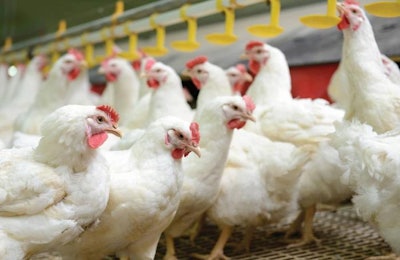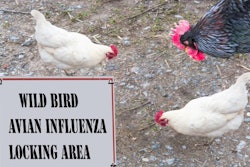
Animal health agencies in Nepal, Saudi Arabia, South Africa and Taiwan have reported new outbreaks of highly pathogenic avian influenza (HPAI) in their respective poultry sectors during the last week.
Saudi Arabia’s Ministry of the Environment, Water and Agriculture has reported to the World Organisation for Animal Health (OIE) a further three outbreaks of HPAI on poultry farms. The cases — all confirmed in the first half of April this year and caused by the H5N8 virus subtype — were on farms in the region of Riyadh in the center of the Kingdom. More than 582,000 birds were lost to the disease in these outbreaks, including 2,100 mortalities.
These latest cases bring the number of HPAI outbreaks in Saudi Arabia since December last year to 32, and more than 5.5 million birds affected.
Taiwan has been battling to control H5N2 HPAI since early 2015. The two outbreaks reported by the veterinary authority to the OIE occurred at the end of May, and led to the death or destruction of almost 16,000 poultry. Latest to be affected were a flock of around 2,500 meat ducks in the county of Changhua, and almost 13,500 native chickens in Yunlin.
A second outbreak of HPAI linked to the H5N1 virus variant has been confirmed in the Bagmati region of Nepal, according to the official report to the OIE. All 6,000 of the five-week-old broilers were lost to the disease after showing signs of dullness, reducing feed intake, and breathing difficulties. According to the Ministry of Livestock Development, the rest of the broiler flock—4,660 birds— as well as 75 backyard chickens in the area and 512 kilograms of feed have been destroyed. The usual hygiene measures have been completed and surveillance is ongoing.
In early May, there was an outbreak of H5N1 HPAI in a commercial layer flock in the district of Chitwan, which is in the neighboring region of Narayani.
China’s agriculture ministry has confirmed details of a new outbreak of HPAI linked to the H7N9 virus variant in a poultry flock. According to the official report to the OIE, the disease affected a flock of 17,000 layers in Shenyang, which is in Liaoning province in the north-east of the country. All the birds died or were destroyed to control the further spread of the disease.
This was the fourth confirmed outbreak of HPAI in the Chinese poultry sector this year, following previous cases in the regions of Guangxi, Shaanxi, and Ningxia.
China study: Call for more surveillance at live poultry markets
Stronger surveillance of avian influenza viruses at live poultry markets and among high-risk populations such as poultry workers is described as “imperative” by the authors of a new study by Chinese and U.S. researchers.
Close monitoring of these groups and at such locations will give important early warning of new genetic constellations and reassortments of the most important H5, H7, and H9 viruses for human and poultry health, according to Ma and co-authors in a paper to be published in Emerging Infectious Diseases in July.
The researchers had conducted surveillance for these virus subtypes in people working with poultry and swine, as well as the general population, and at live poultry markets in the city of Wuxi over three years.
Their study revealed high diversity of the viruses at the markets. Although the seroprevalence of the H5N1, H7N9, and H9N2 viruses was generally low— even among poultry workers — the scientists found evidence of viral seroconversion among some of the people surveyed, indicating the possibility of the emergence of new and virulent virus types.
Africa: HPAI detected on South African poultry farm
According to the latest official report to the OIE from South Africa’s agriculture department, the H5N8 subtype of the HPAI virus was detected at a farm with more than 30,000 poultry of unspecified type during the first week of June. The farm was located in Gauteng Province in the north-east of the country. In this latest outbreak — which brings the country’s total over the last year to 190 — it is recorded 95 of the birds died, and the rest were scheduled for destruction.
Europe: Swedish wild bird tests positive for HPAI virus
Sweden’s Ministry of Rural Affairs has confirmed to the OIE that one more wild bird has tested positive for the H5N6 HPAI virus variant. The bird, an eagle, was found dead in April in Sodermanland county in the south-east of the country.















